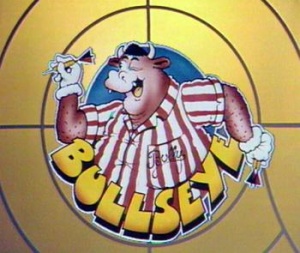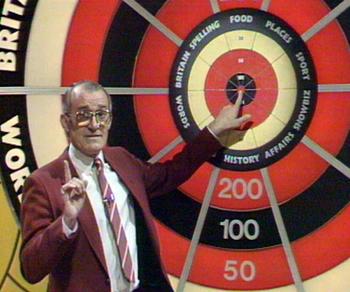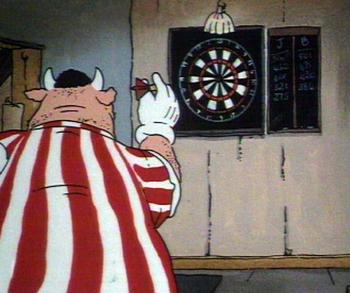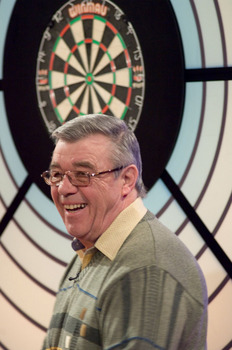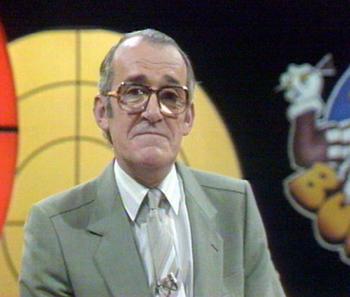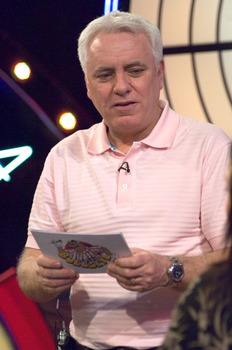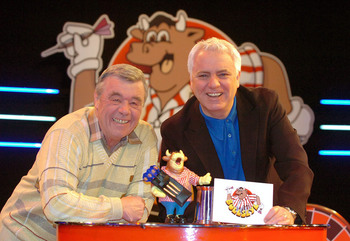Bullseye
Contents |
Host
Jim Bowen (1981-95)
Dave Spikey (2006)
Vernon Kay (2007 special)
Co-hosts
Voiceover: Nick Owen (1981-2)
Scorer: Tony Green (1982-95, 2006)
Hostess: Marti Caine (1988 Christmas special)
Broadcast
ATV in association with Chatsworth Television for ITV, 28 September to 21 December 1981 (15 episodes in 1 series)
Central in association with Chatsworth Television for ITV, 10 October 1982 to 30 April 1989 (176 episodes in 7 series + 6 specials)
Central in association with Talbot Television 29 October 1989 to 8 July 1995 (133 episodes in 6 series + 4 specials)
Granada and Thames for ITV1, 22 October 2005 (Gameshow Marathon one-off)
Granada Yorkshire for Challenge, 17 April to 22 September 2006 (30 episodes in 1 series)
ITV Productions and TalkbackThames for ITV1, 19 May 2007 (Gameshow Marathon one-off)
Synopsis
Super, smashing, great
On Sunday evenings through the winter months, Bullseye stopped being a game-show and began to be an institution. Club comedian Jim Bowen's style and catchphrases such as "super, smashing, great" spawned a large number of mickey-takes (not to mention the odd notable out-take on It'll be Alright on the Night).
Three pairs of contestants, an amateur dart player and a non-dart player, would compete in three rounds.
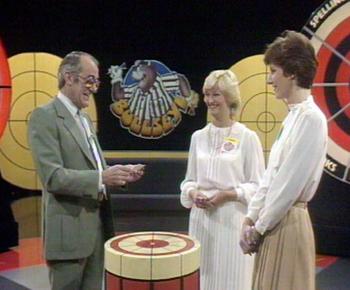 Jim Bowen interviews the contestants. The Round 1 dartboard can be seen in the background.
Jim Bowen interviews the contestants. The Round 1 dartboard can be seen in the background.Take aim...
In Round 1, the dart player would aim for one of ten segments on a specifically constructed board. Money was won depending on how close the dart came to hitting the bullseye - but only if the dart landed in the category nominated by the non-dart player. More money could be won by the non-dart player answering a question on the category associated with the segment. Once a category had gone, the dart player had to avoid it otherwise no money could be won in subsequent throws.
After each player had thrown one dart three times, the couple with the least amount of money retired. (This final rule was changed in series eight so that two teams were eliminated at the end of Round 2 to give the lagging team a chance to catch up.) The consolation prize was a "bendy Bully", a toy version of the show's portly bovine mascot. Oh, and some darts and tankards - and in the early shows, before the Bendy Bullies, chalk-holders (don't ask!)
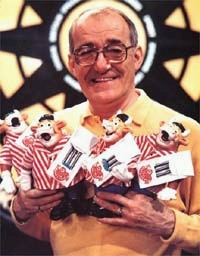 Jim Bowen doles out the consolation prizes - Bendy Bullies
Jim Bowen doles out the consolation prizes - Bendy BulliesIn Round 2, a standard dart board was used. Each dart-player threw three darts. The highest scoring dart player would win the right for his partner to answer a question, the reward being the dart player's score in (British) pounds.
What's Bully got in store tonight?
After an interlude where a professional darts player (or sometimes a celebrity from the world of showbiz, who was always given a 60-point head start) tries to throw for money for a charity (known as "Bronze Bully Time", because the professional who scored the most at the end of the series got to hold a large Bully trophy made from bronze for the year - nine darts with pounds for points going to charity, doubled if they made 301 or more), the highest scoring team went through to Bully's Prize Board, another specially constructed dart board containing eight quite narrow red segments (which claimed prizes), quite large black segments (which did nothing) and a fairly large bullseye. Hitting a red segment corresponded with claiming one of eight prizes, and hitting the bullseye claimed Bully's Special Prize.
One jeopardy, which happened quite a lot more than you might think, occurred when a dart hit the same red segment or the bullseye twice. This caused the prize to be lost or, as the host infamously put it, "Keep out of the black and in to the red, There's nothing in this game for two in a bed".
Are they going to gamble?
Once the prizes had been won, the team had the option of gambling their prizes (and, in later series, all the money they had won in the earlier part of the show as well). To win the gamble, both members of the team had to throw three darts at a standard dart board, the non-dart player throwing first, with their combined score totalling 101 or more.
If the winning couple decided not to gamble for the star prize, then they were sent on their way with a round of applause and the previous second-placed couple were then invited out to see if they wanted to gamble their money from the quiz. They would usually say "Yes" as putting a few quid on the line to win a speedboat was less of a gamble than potentially throwing away a washing machine and a hi-fi. However, on at least one programme all three couples took home the prizes/money quite happily, so the 101 challenge was not played at all.
Before the darts were thrown, it was de rigeur for announcer Tony Green (pictured) to say "Take yer time" more often than necessary. If they won the star prize they got to keep their money and prizes from Round 3 too.
For their time, the prizes on Bullseye were very generous. Speedboats, cars, holidays and caravans would feature regularly. But, if the contestants failed in the final gamble, they had to see the star prize regardless - "Look at what you could have won."
Key moments
There were two bits of music played out over the credits - a jolly upbeat tune if the players won Bully's Star Prize, and a rather more downbeat one if they lost.
On one occasion, one couple won over £1,000, but the scoring could only accommodate three digits. So they manually stuck a "1" on a piece of card on the front of their desk.
It was often painful to see the non-dart player score 97 with some jammy shots, only for the supposed "dart player" to try to hit 20, but hit 1 three times instead and thereby lose.
Outtake ahoy: Jim once asked "In which state of the United States was President Kennedy assassinated... in Texas?"
Catchphrases
The show always started with the cry of, "It's a bulllllseye! And here's your host - Jiiiim Bowen!"
"Keep out of the black and in the red, nothing in this game for two in a bed."
"Look at what you could have won."
"And Bully's Special Priiiiize..."
"Now the cash you won for charity earlier... that's safe."
"In you come, boys!"
"Super, smashing, great." (somewhat apocryphal - Bowen said 'smashing' as a reflex action after one contestant revealed that he'd been made unemployed)
"Iiiiiiin one..."
"You win nothing but your BFH... Bus Fare Home"
(into the ad break) "I've got £___ here and it'll take me two minutes to count out."
"...And the category's gone, so I can't ask the question!"
"All for the throw of a dart"
"Go for your lights" (in the prize board round - although this changed after a while. In other series, the lights represented what they had won)
"You've got the time it takes for the board to revolve..."
"Up to the oche - and listen to Tony!"
"You can't beat a bit of Bully!"
"Bully's bellowed you out there!"
"Let's check that with Bully" (for the spelling category)
"The subjects that are lit are the ones you can hit!"
Dave Spikey version:
"You've had a good night out - but you go home with nowt!"
"Throwers and knowers" (dart players and question answerers)
"They risked it, they missed it!" (oh no, they didn't get the speedboat)
Inventor
Devised by Andy Wood and Norman Vaughan.
Trivia
Jim Bowen claims that he was the producer's fifth choice of host. The first three turned it down and the fourth said he'd check his diary.
The first two programmes were so bad they were scrapped and never broadcast. This was especially expensive because a car had been won in one of them.
By the end of its original run, the show was getting 12,000 applications a year and there was a five year waiting list just to sit in the audience!
A celebrity Christmas special in 1986 included Fatima Whitbread - javelins/darts, you see?
Why so many speedboats? In certain series, the producers had done a deal with a speedboat manufacturer so there were actually two prizes hidden behind Bully - one was a speedboat if you won, and the other was Random Prize X if you lost.
Five-times World Darts Champion Eric Bristow holds the record score for the nine charity darts with 380. Mike Gregory managed to match this feat. Update: Dartist Kevin "The Undertaker" Thomas writes to us thus: Just to correct you on the highest charity score, Welshman Alan Evans hit a remarkable 401 in the very early days of Bullseye. He scored 180, 180, 41. You can check that if you like, but I have this episode on tape and it's a fact. They said 380 was the record on Ant & Dec too which was incorrect. See for yourself. The debate rages on!: Robin Carmody writes: I saw the Alan Evans episode on Challenge recently. It came from the 1984-85 series, before the Bronze Bully had been introduced and when a celebrity would have nine darts (with a start of 60) every other week. The thing was that Evans' last treble 20 actually fell off the board, but had clearly hit the treble 20 beforehand. This was, strangely, not actually referred to; no doubt they allowed it to stand so that he could have two 180s. Perhaps they later revised this down to 341, therefore making 380 the record, or perhaps they only count scores after the arrival of the Bronze Bully.
In early series, Jim usually mentioned the ITV region from whence the contestants hailed, except if they came from Northern Ireland when it was always "over the water".
If the first couple didn't take the prize gamble, and the other two couples had each won the same amount of money, then both teams would be brought out and asked in turn whether they wanted to gamble. If they both said 'yes' there'd be a tie-breaker with the dart players each throwing three darts at the board, the highest scorer winning.
Bullseye also gave its name to a made-for-television darts tournament on BBC2 (think Pot Black, with arrows replacing balls) which ran for two series in 1980 and 1981. The ITV show began less than three weeks after the BBC show ended.
One contestant on the Dave Spikey version thought that every country had its own sun.
The signature tune was voted the best game show theme in a 2008 survey for Churchill Insurance.
The show has been produced in a number of locations over the years. It was first produced at ATV Centre/Central House at Bridge Street in Birmingham before being moved to Central's purpose built studios at Lenton Lane in Nottingham. The Challenge version was produced at YTV at Kirstall Road in Leeds and the Gameshow Marathon versions were produced at LWT's famous studios on the South Bank in London. Well, where Bully goes, Tony follows!
In 1983, the makers of Bullseye put together a very special "late-night" edition of the show for the Central Television Christmas tape. For those of you not in the know, "Christmas tapes" were tapes produced in the 1970s and 80s by bored and possibly jaded VT editors from the BBC and ITV regions who had to work on Christmas day (how else are people meant to watch Morecombe and Wise on the 25th?), compiled over the course of the year for viewing on the big day. To begin with these would usually comprise of X-rated bloopers (the kind you see on TV's Naughtiest Blunders 782 these days), but over time programme makers would make clips especially for the tapes. The most infamous is almost certainly the "Rude Rainbow" clip, an innuendo-filled mini-episode of children's favourite Rainbow written by the voice of Zippy and George, Roy Skelton, but a close second would be this Bullseye clip. In just under three minutes we get a foul-mouthed Jim Bowen in a stained string vest, Bully with a bout of flatulence, Tony Green as a semi-naked blind man (honestly, we're not making this up) and contestants from Cockermouth (ho ho) answering questions about vasectomies and gay cannibals. Then there's the, ahem, "laddish" language. It was, as they say, a different time... We are, of course, a family friendly website, but if you're that way inclined you can find it quite easily on YouTube.
A 1989 episode turned up as evidence in a 2011 murder trial. The accused had been a contestant on the show shortly before the crime took place, and the episode was used as evidence that his appearance at the time matched the description of the culprit given to police. John Cooper was found guilty of two double murders as a result.
Merchandise
A Bullseye board game was made, and reissued in 2005.
Web links
Pictures
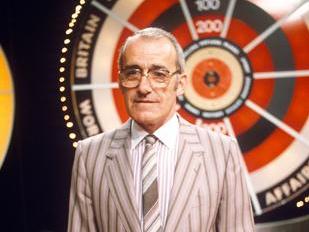 Jim Bowen in front of the dartboard.
Jim Bowen in front of the dartboard.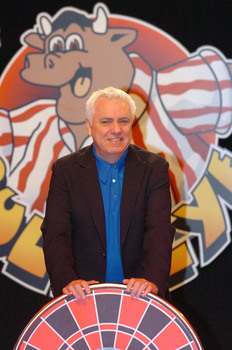 New host, Dave Spikey behind a contestant's podium.
New host, Dave Spikey behind a contestant's podium.See also
Weaver's Week reviews: the 1984 series | the Challenge revival

